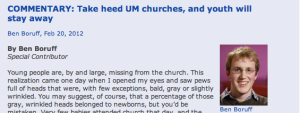
This theme of why young people are leaving the church is picking up steam all over, and instead of recapping them, i’m going to link to a few recent articles. two are from Christian Piatt, a writer and DOC pastor that I’ve been getting to know. He started with a “7 Reasons Young People Quit Church” for the Sojourners blog, and followed up today with “4 more BIG reasons” on his own blog, hosted at Patheos.com. I appreciate Christian’s insight, especially as it’s grounded not only in his personal faith story, but is also rooted in his experience as a minister in a local church, alongside his wife Amy.
One particularly striking experience he recounted has to do with the disconnect with churches after high school. He says, “When I went to college, I was contacted by fraternities, campus activity groups and credit card companies, but not one church.” He goes on to recount the myriad needs he had and would have appreciated being addressed by churches, but found none of them. Whether one heads to college (a shrinking percentage in these economic times), enters the workforce or a combination, our program-centric models are not doing anything substantial to help bridge this time in life. I’ll be writing more about that in the coming weeks.
Side note: The Piatts have recently been called from their current home in Durango, CO to First Christian Church (DOC) in Portland, OR, where they will start June 1st. Amy will be the senior pastor and Christian will serve in a part time role. Portland is getting a boatload of wisdom, talent and passion.

I'm Ben Boruff. Alienate me!
The other article is an editorial from the United Methodist church website, as a young adult there, Ben Boruff, explains just how the church can keep youth away. It’s a nice piece of passion, insight, satire and to-the-point challenge. His assertion is that churches know how to engage young people, but his conclusion reads, “it took quite some time for my naïve mind to find the only logical conclusion. These churchgoers did not want young people in their churches.” Ben then goes on to outline his own list of ways that churches can continue to alienate and be made irrelevant to young adults. The substance of this satire, though, is all about substance. It’s not about programs, flashiness or hipsterism – it’s about connection, challenge, meaning and community.
I’m thankful to hear voices like these in our work to challenge and inspire us to dig deeper and be intentional about how we approach our lives of faith and community.
 On the, “this is a FANTASTIC idea” side of things, I want to point out something I discovered in December, which is good, because it started with an Advent program. It’s as growing experiment by our Episcopal family in Portland, OR, and is called Pop-Up Church. It was semi-inspired by the growing trend of food trucks and portable culinary experiences. Simply put, one congregation worked with a number of others in the Portland area and created 30-minute advent devotional services that were rooted in the liturgy of the church. No technology, no bells and whistles, just ancient spiritual devotional practices, followed by an open invitation to discuss afterward at a nearby pub.
On the, “this is a FANTASTIC idea” side of things, I want to point out something I discovered in December, which is good, because it started with an Advent program. It’s as growing experiment by our Episcopal family in Portland, OR, and is called Pop-Up Church. It was semi-inspired by the growing trend of food trucks and portable culinary experiences. Simply put, one congregation worked with a number of others in the Portland area and created 30-minute advent devotional services that were rooted in the liturgy of the church. No technology, no bells and whistles, just ancient spiritual devotional practices, followed by an open invitation to discuss afterward at a nearby pub.
My understanding is that the experiment took hold, and has continued into the new year. A couple of the things that I love about this are:
1) The service is low/no tech. It provides a quiet space to get away from the busy-ness of life and technology.
2) The means of invitation are primarily online. They use Facebook, Twitter and a simple website to convey information about how to find a meaningful experience.
3) It has a social / process component built in to not only address the experience, but allow for community to build.
4) It allows congregations throughout the diocese to host something for a different audience with minimal planning or anxiety.
This last part is of particular interest, because the bar for “success” is set pretty low. There’s no massive period of each church planning, programming and worrying about what happens if 10 people show up to a 600 seat sanctuary. It was designed to work for whoever was there, and by using the existing liturgy, the content of the service was taken care of. It took a motivated core team to come up with the idea and invite other churches to participate. But they got to experiment and play with the idea, and it took hold. What a great way for these church buildings to be used and made known to different communities in their midst.
PopUp Church is an example of low risk / high creativity innovation. It lets people experiment in fun ways, blending tradition and new technology, community and invitation in a cultural vocabulary that connects. What’s more, they don’t intend it to replace a church or even build itself into an institution. When it no longer meets peoples’ needs, it will stop. If it continues to meet needs, it continues. Either way, the folks at All Saints Episcopal are trying things that express their values in new and different ways, and that’s an exciting development.
Later this week: The Centro Romero Sex Trafficking Conference is coming in late April. PLEASE consider attending this. There is partial scholarship money available and we need to have younger voices advocating for those victimized by the sex trade.







